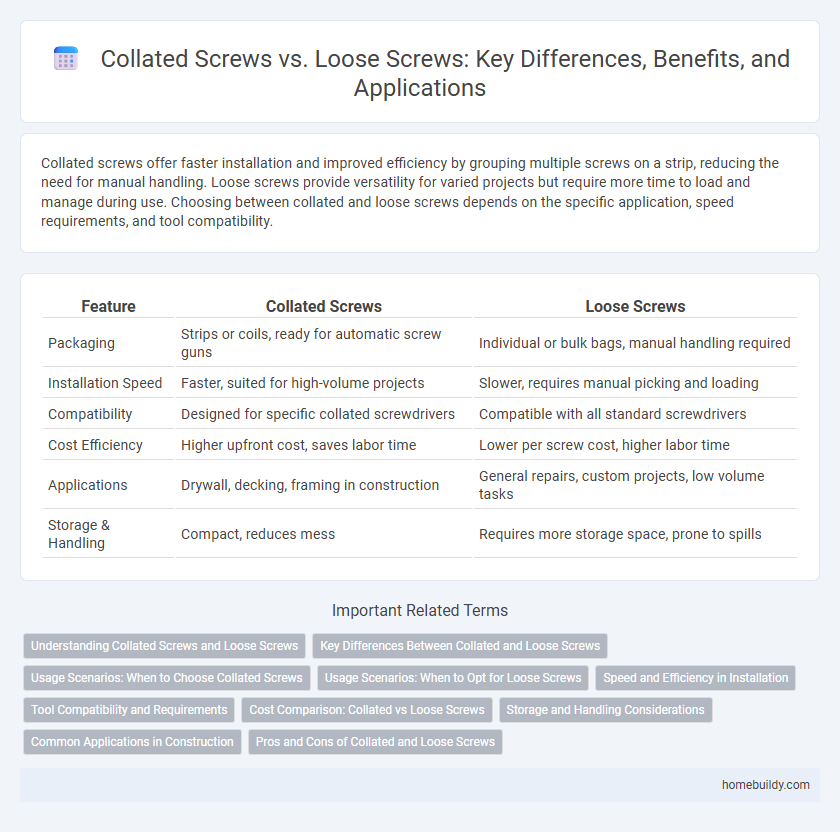Collated screws offer faster installation and improved efficiency by grouping multiple screws on a strip, reducing the need for manual handling. Loose screws provide versatility for varied projects but require more time to load and manage during use. Choosing between collated and loose screws depends on the specific application, speed requirements, and tool compatibility.
Table of Comparison
| Feature | Collated Screws | Loose Screws |
|---|---|---|
| Packaging | Strips or coils, ready for automatic screw guns | Individual or bulk bags, manual handling required |
| Installation Speed | Faster, suited for high-volume projects | Slower, requires manual picking and loading |
| Compatibility | Designed for specific collated screwdrivers | Compatible with all standard screwdrivers |
| Cost Efficiency | Higher upfront cost, saves labor time | Lower per screw cost, higher labor time |
| Applications | Drywall, decking, framing in construction | General repairs, custom projects, low volume tasks |
| Storage & Handling | Compact, reduces mess | Requires more storage space, prone to spills |
Understanding Collated Screws and Loose Screws
Collated screws are pre-arranged in strips or bands, enabling faster, more efficient installation with automatic screwdrivers or collated screw guns, significantly improving productivity on large projects. Loose screws, sold individually or in bulk, provide flexibility for smaller jobs or situations requiring varied screw types but require manual handling, which can slow down the fastening process. Understanding the differences between collated screws and loose screws helps optimize tool selection and workflow efficiency based on project scale and application.
Key Differences Between Collated and Loose Screws
Collated screws are pre-arranged in strips or coils, enabling faster and more efficient installation with automatic screw guns, while loose screws require manual handling and individual placement. The key differences lie in productivity and convenience; collated screws reduce time and labor costs by minimizing reloads, whereas loose screws offer flexibility for customized screw sizes and applications. Choosing between collated and loose screws depends on the project scale, speed requirements, and specific fastening needs.
Usage Scenarios: When to Choose Collated Screws
Collated screws are ideal for high-volume projects requiring speed and efficiency, such as decking, drywall installation, and framing, where using a screw gun or collated screw driver significantly reduces fastening time. Loose screws suit smaller jobs, repairs, or precision work where manual placement and individual control are necessary. Choosing collated screws streamlines workflow in repetitive tasks, minimizing downtime caused by reloading and enhancing productivity on construction sites.
Usage Scenarios: When to Opt for Loose Screws
Loose screws are ideal for custom projects requiring precise screw placement and varied screw sizes, such as small repairs, woodworking, or tasks with limited accessibility. They offer flexibility for manual driving or when using different tools, making them suitable for tight spaces where collated screws may not fit. Opting for loose screws enhances control in delicate or specialized applications where automated feeding systems are impractical.
Speed and Efficiency in Installation
Collated screws significantly increase speed and efficiency in installation by allowing rapid, automated feeding into screw guns, reducing manual handling and downtime. Loose screws require individual placement, slowing the process and increasing fatigue, which can hinder productivity on large-scale projects. Using collated screws minimizes retrieval time and improves workflow consistency, making them ideal for high-volume fastening tasks.
Tool Compatibility and Requirements
Collated screws are designed for use with automatic screw guns or collated screwdrivers, ensuring rapid and consistent fastening with minimal manual effort. Loose screws require manual handling or a standard cordless screwdriver, resulting in slower installation and increased fatigue. Tool compatibility with collated screws enhances productivity on large-scale projects, while loose screws are more versatile for small-scale or precision tasks.
Cost Comparison: Collated vs Loose Screws
Collated screws typically reduce labor costs by speeding up installation with automatic feeding systems, while loose screws may initially appear cheaper per unit but increase overall project expenses due to slower handling and higher risk of loss. The cost efficiency of collated screws becomes more apparent in large-scale or repetitive projects where time savings translate directly into lower labor costs. Budget assessments should consider not only the unit price but also installation time, waste reduction, and tool compatibility to determine the most cost-effective option.
Storage and Handling Considerations
Collated screws are stored in strips or coils that reduce packaging bulk and simplify automated feeding in power tools, minimizing handling time and improving job site efficiency. Loose screws require secure, moisture-resistant containers to prevent corrosion and loss, making inventory control more critical during transport and storage. Proper storage conditions for both types include dry, temperature-controlled environments to maintain material integrity and ensure optimal fastening performance.
Common Applications in Construction
Collated screws are widely used in drywall installation and decking due to their compatibility with automatic screw guns, enhancing speed and consistency in large-scale projects. Loose screws offer flexibility for detailed carpentry and repair work where precision and varied screw sizes are essential. Construction professionals often choose collated screws for framing and subflooring to improve efficiency, while loose screws remain preferred for custom fitting and finishing tasks.
Pros and Cons of Collated and Loose Screws
Collated screws offer faster installation and reduced handling time, ideal for high-volume projects, but can be more expensive and less versatile for small tasks or hard-to-reach areas. Loose screws provide greater flexibility in size and type selection, allowing precise customization, yet they require more manual effort and slower application compared to collated systems. Choosing between collated and loose screws depends on project scale, speed requirements, and budget considerations.
collated screws vs loose screws Infographic

 homebuildy.com
homebuildy.com